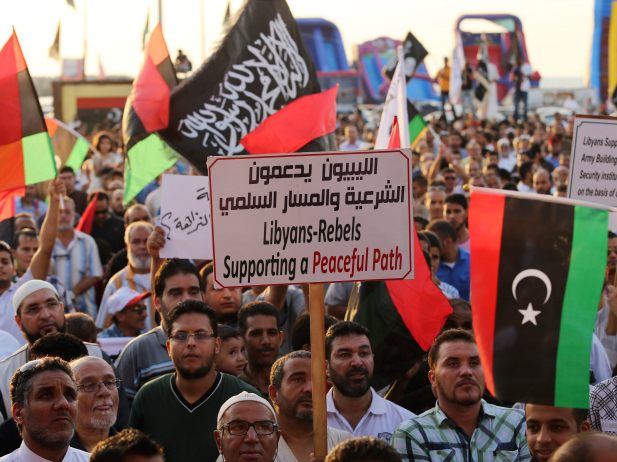The international community should not follow Egypt and others in siding with anti-Islamists in the Libyan conflict, but should push both warring sides much harder towards a political agreement, a leading think tank said Thursday. Libya has been in turmoil since the NATO-backed overthrow of longtime leader Moamer Gaddafi in 2011, but violence has intensified, and Islamic State combatants have recently gained prominence, fuelling international concern.
In a report on the escalating conflict, the International Crisis Group (ICG) said the international community had been “at best irresolute and disaffected and at worst divided” in dealing with the Libyan crisis.
The Brussels-based group estimated that 1,000-2,500 Libyans have died since mid-2014, while the number of internally displaced people and refugees quadrupled to 400,000.
Libya is split between an internationally recognized government and parliament in the eastern city of Tobruk – including some ex-Gaddafi regime figures – and an Islamist-dominated rebel government and parliament in the capital, Tripoli.
The ICG said Egypt and the United Arab Emirates were helping Tobruk militarily and politically, and “often appear more concerned with defeating political Islamists than saving Libya and too often encourage escalation rather than help restore calm.”
Countries backing the Tripoli side – Qatar, Sudan and Turkey – were described as more conciliatory and ready to support UN peace talks, while two neutral neighbours – Algeria and Tunisia – were said to “lack the clout to make a difference.”
Spanish diplomat Bernardino Leon has been conducting UN mediation efforts in Geneva, supported by the “P3+5” – a group comprising the United States, Britain, France, Germany, Italy, Spain, the European Union and the UN.
To help Leon, the international community should stop treating the Tobruk side as Libya’s sole legitimate government, because that recognition is encouraging it to walk away from UN talks and pursue a military resolution to the conflict, the ICG said.
“Peace talks should proceed on the basis that no winner-takes-all solution is possible. Parties need guarantees that when they compromise and give up some power, they will not face reprisal or even extinction. Such fears exist on both sides,” the ICG said.
Tobruk authorities reportedly suspended their participation in the Geneva process earlier this week. The ICG also advised a tightening of the arms embargo on Libya, rather than its relaxation, as Egypt is suggesting to help General Khalifa Haftar, the Tobruk-side strongman who is fighting both Tripoli loyalists and hardline jihadists in Benghazi.
The think tank said Libya’s key institutions – the central bank, its oil and gas company and sovereign wealth fund – should be kept independent of the warring sides, and added that any blacklisting of officials blocking the UN process should not be one-sided.
The ICG quoted diplomats as saying that attempts to slap international sanctions on selected Libyan officials have been stymied by France and Russia’s refusal to come down on Haftar’s side as hard as on its main rival, the Libya Dawn militias.
If a political breakthrough is reached, sending an international peacekeeping mission – as suggested by former colonial power Italy -could be a good but risky idea, the ICG said, warning that foreign troops would become “a primary target” for jihadists.
The ICG did not examine in detail the extent to which Islamic State terrorists – whose beheading of 21 mostly Egyptian Coptic Christians in January made worldwide news – have made inroads into the Libyan conflict.
But it cautioned that protracted infighting – against the backdrop of a dissolving oil-rich state on the brink of insolvency – would see more parts of the country turn into “safe zones for transnational jihadists.”
Warning of the need to make “hard choices” to force a peace deal, the ICG report concluded ominously: “The region has no shortage of grim examples of what happens when a state disintegrates and warlords rule.” SAPA






 WhatsApp us
WhatsApp us 

